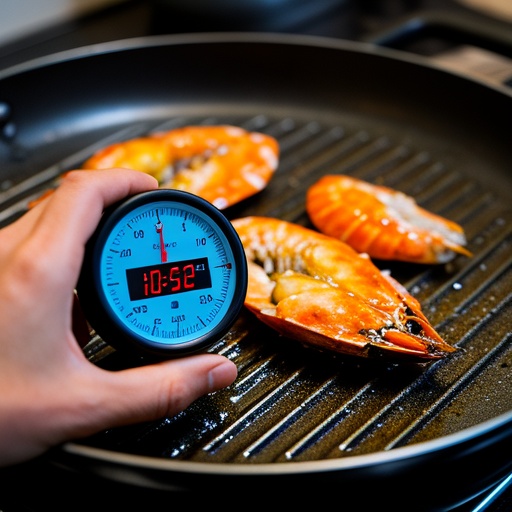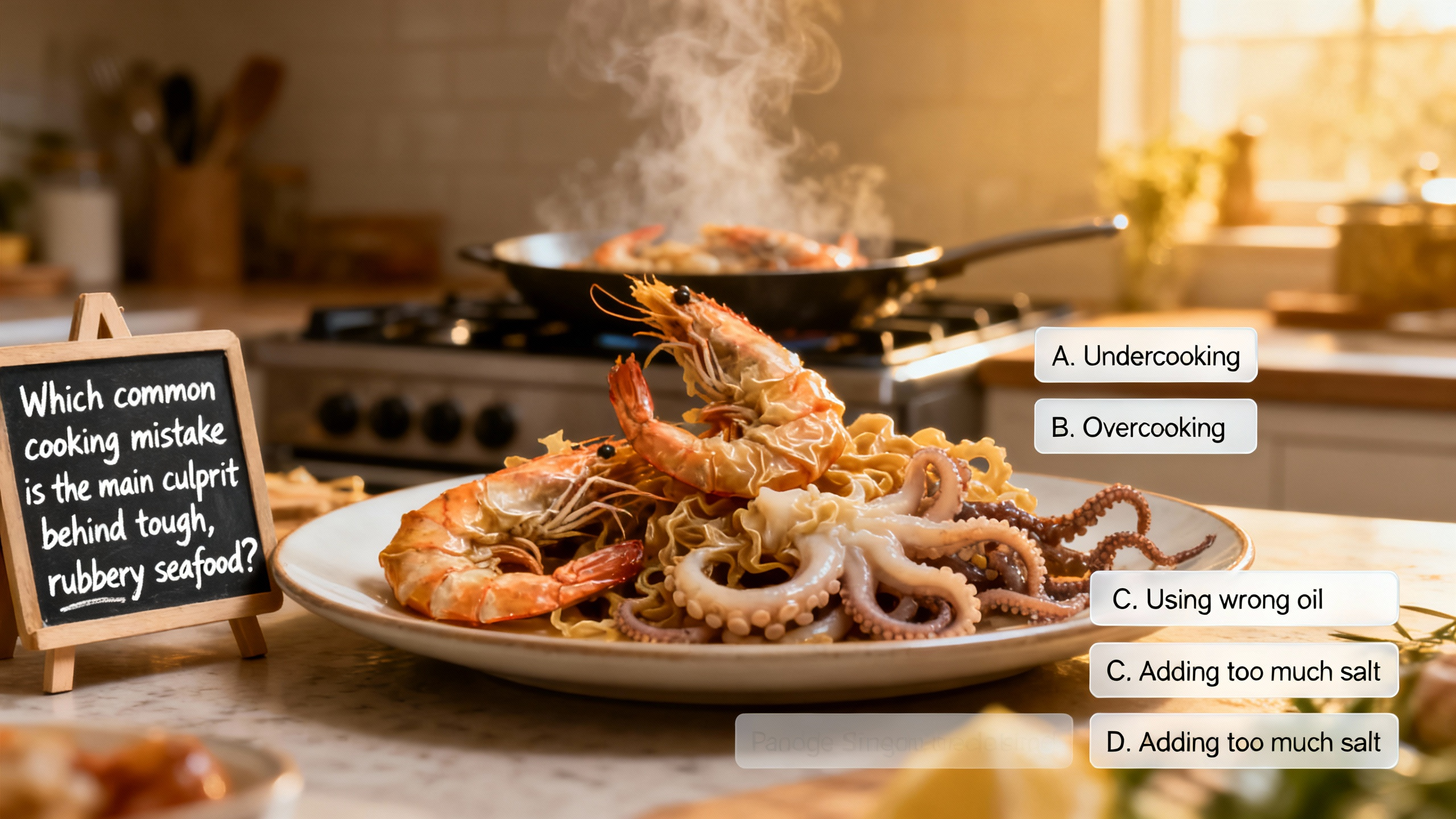The Secret to Tender Seafood: Avoid Overcooking
 The world of seafood offers a plethora of culinary delights, from the flaky textures of various fish species to the succulent sweetness of shrimp and scallops. However, one of the most common pitfalls in seafood preparation is overcooking, which can turn a potentially exquisite dish into a disappointment. The main culprit behind tough, rubbery seafood is overcooking. Seafood, such as fish, shrimp, and scallops, has a relatively short cooking time compared to other types of meat. Its muscle fibers are more delicate and contain less connective tissue. To understand why overcooking has such a detrimental effect on seafood, we need to delve into the science of cooking. Seafood is composed of proteins, water, and fats. When heat is applied during cooking, the proteins in the seafood begin to denature. This means that their structure changes, and they start to coagulate. In the case of seafood, its relatively delicate nature makes it highly susceptible to these changes. As the proteins coagulate and shrink, they exert pressure on the moisture within the seafood. This causes the moisture to be squeezed out, resulting in a dry, tough, and rubbery texture. For instance, let's take a closer look at the different types of seafood. Fish, which comes in a wide variety of species, each with its own unique flavor and texture, is particularly sensitive to overcooking. A thin fillet of fish, like a sole or a flounder, might only need 2 - 3 minutes per side in a hot pan. These fish have a very fine texture, and their muscle fibers are extremely delicate. If it is left on the heat for much longer, the fish will quickly become dry and lose its flaky, tender quality. Imagine biting into a piece of fish that is supposed to be moist and flaky, but instead, it crumbles into dry, tasteless bits. It's a far cry from the delicious experience that properly cooked fish can offer. On the other hand, shrimp are another popular seafood item that is often overcooked. Shrimp are ready when they turn pink and curl into a C - shape. This transformation is a clear indication that the shrimp are cooked to perfection. Their natural sweetness is at its peak, and the texture is firm yet tender. However, if you continue to cook them beyond this point, they will become tough and chewy. You might have experienced this when ordering a shrimp dish at a restaurant or cooking them at home. The once - plump and juicy shrimp turn into something that resembles a rubber band, making them unappetizing. Scallops are also a prime example of seafood that requires careful cooking. These sweet and buttery mollusks have a very short cooking window. When cooked correctly, scallops have a soft, creamy texture on the inside with a slightly caramelized exterior. But overcooking scallops can turn them into hard, rubbery discs. They lose their natural flavor and become a disappointment on the plate.
The world of seafood offers a plethora of culinary delights, from the flaky textures of various fish species to the succulent sweetness of shrimp and scallops. However, one of the most common pitfalls in seafood preparation is overcooking, which can turn a potentially exquisite dish into a disappointment. The main culprit behind tough, rubbery seafood is overcooking. Seafood, such as fish, shrimp, and scallops, has a relatively short cooking time compared to other types of meat. Its muscle fibers are more delicate and contain less connective tissue. To understand why overcooking has such a detrimental effect on seafood, we need to delve into the science of cooking. Seafood is composed of proteins, water, and fats. When heat is applied during cooking, the proteins in the seafood begin to denature. This means that their structure changes, and they start to coagulate. In the case of seafood, its relatively delicate nature makes it highly susceptible to these changes. As the proteins coagulate and shrink, they exert pressure on the moisture within the seafood. This causes the moisture to be squeezed out, resulting in a dry, tough, and rubbery texture. For instance, let's take a closer look at the different types of seafood. Fish, which comes in a wide variety of species, each with its own unique flavor and texture, is particularly sensitive to overcooking. A thin fillet of fish, like a sole or a flounder, might only need 2 - 3 minutes per side in a hot pan. These fish have a very fine texture, and their muscle fibers are extremely delicate. If it is left on the heat for much longer, the fish will quickly become dry and lose its flaky, tender quality. Imagine biting into a piece of fish that is supposed to be moist and flaky, but instead, it crumbles into dry, tasteless bits. It's a far cry from the delicious experience that properly cooked fish can offer. On the other hand, shrimp are another popular seafood item that is often overcooked. Shrimp are ready when they turn pink and curl into a C - shape. This transformation is a clear indication that the shrimp are cooked to perfection. Their natural sweetness is at its peak, and the texture is firm yet tender. However, if you continue to cook them beyond this point, they will become tough and chewy. You might have experienced this when ordering a shrimp dish at a restaurant or cooking them at home. The once - plump and juicy shrimp turn into something that resembles a rubber band, making them unappetizing. Scallops are also a prime example of seafood that requires careful cooking. These sweet and buttery mollusks have a very short cooking window. When cooked correctly, scallops have a soft, creamy texture on the inside with a slightly caramelized exterior. But overcooking scallops can turn them into hard, rubbery discs. They lose their natural flavor and become a disappointment on the plate.
 To avoid this common cooking mistake, it's important to pay close attention to the cooking time and temperature. Different cooking methods also play a crucial role in the outcome of your seafood dish. For example, pan - frying is a popular method for cooking fish and shrimp. When pan - frying, make sure your pan is hot before adding the seafood. This helps to sear the outside quickly, locking in the moisture. But even with a hot pan, you still need to be mindful of the time. Baking is another method used for cooking seafood. When baking fish, it's important to preheat your oven to the right temperature. A general rule of thumb is to bake fish at around 375°F (190°C). However, the cooking time will vary depending on the thickness of the fish. A thicker fillet will require more time in the oven, but you still need to be cautious not to overdo it. You can use a timer and start checking the seafood a minute or two before the recommended cooking time is up. This gives you a buffer to ensure that the seafood is cooked just right. Grilling is a great way to add a smoky flavor to your seafood. But grilling also requires careful attention. The high heat of the grill can quickly cook the outside of the seafood, while the inside may still be undercooked or overcooked if not monitored properly. You need to oil the grill grates well to prevent the seafood from sticking and to ensure even cooking.
To avoid this common cooking mistake, it's important to pay close attention to the cooking time and temperature. Different cooking methods also play a crucial role in the outcome of your seafood dish. For example, pan - frying is a popular method for cooking fish and shrimp. When pan - frying, make sure your pan is hot before adding the seafood. This helps to sear the outside quickly, locking in the moisture. But even with a hot pan, you still need to be mindful of the time. Baking is another method used for cooking seafood. When baking fish, it's important to preheat your oven to the right temperature. A general rule of thumb is to bake fish at around 375°F (190°C). However, the cooking time will vary depending on the thickness of the fish. A thicker fillet will require more time in the oven, but you still need to be cautious not to overdo it. You can use a timer and start checking the seafood a minute or two before the recommended cooking time is up. This gives you a buffer to ensure that the seafood is cooked just right. Grilling is a great way to add a smoky flavor to your seafood. But grilling also requires careful attention. The high heat of the grill can quickly cook the outside of the seafood, while the inside may still be undercooked or overcooked if not monitored properly. You need to oil the grill grates well to prevent the seafood from sticking and to ensure even cooking.
 You can also use a meat thermometer to ensure that the internal temperature reaches the right level without overcooking. For fish, an internal temperature of 145°F (63°C) is generally ideal. This temperature ensures that the fish is cooked through while still maintaining its moisture and tenderness. When using a meat thermometer, insert it into the thickest part of the fish, away from the bone if there is one. For shrimp, the internal temperature should reach about 165°F (74°C). This might seem a bit high compared to fish, but it ensures that the shrimp are fully cooked and safe to eat. When cooking scallops, an internal temperature of around 120 - 125°F (49 - 52°C) is sufficient for a medium - rare to medium doneness, which is often preferred for their delicate texture. Another useful tip is to let the seafood rest after cooking. Just like with other meats, allowing seafood to rest for a few minutes after cooking helps the juices redistribute within the flesh. This results in a more moist and flavorful final product. For example, if you've grilled a piece of fish, let it sit on a warm plate for 2 - 3 minutes before serving. In addition to using a timer and a meat thermometer, you can also rely on visual cues. As mentioned earlier, shrimp turn pink and curl into a C - shape when cooked. Fish should flake easily with a fork when it's done. Scallops will develop a nice golden - brown crust on the outside when cooked properly. By being vigilant during the cooking process, you can enjoy tender and delicious seafood every time. Whether you're a novice cook or an experienced chef, mastering the art of cooking seafood to perfection is a skill that will enhance your culinary repertoire and bring joy to your taste buds. So, the next time you're in the kitchen preparing a seafood dish, remember the importance of avoiding overcooking and savor the wonderful flavors that seafood has to offer.
You can also use a meat thermometer to ensure that the internal temperature reaches the right level without overcooking. For fish, an internal temperature of 145°F (63°C) is generally ideal. This temperature ensures that the fish is cooked through while still maintaining its moisture and tenderness. When using a meat thermometer, insert it into the thickest part of the fish, away from the bone if there is one. For shrimp, the internal temperature should reach about 165°F (74°C). This might seem a bit high compared to fish, but it ensures that the shrimp are fully cooked and safe to eat. When cooking scallops, an internal temperature of around 120 - 125°F (49 - 52°C) is sufficient for a medium - rare to medium doneness, which is often preferred for their delicate texture. Another useful tip is to let the seafood rest after cooking. Just like with other meats, allowing seafood to rest for a few minutes after cooking helps the juices redistribute within the flesh. This results in a more moist and flavorful final product. For example, if you've grilled a piece of fish, let it sit on a warm plate for 2 - 3 minutes before serving. In addition to using a timer and a meat thermometer, you can also rely on visual cues. As mentioned earlier, shrimp turn pink and curl into a C - shape when cooked. Fish should flake easily with a fork when it's done. Scallops will develop a nice golden - brown crust on the outside when cooked properly. By being vigilant during the cooking process, you can enjoy tender and delicious seafood every time. Whether you're a novice cook or an experienced chef, mastering the art of cooking seafood to perfection is a skill that will enhance your culinary repertoire and bring joy to your taste buds. So, the next time you're in the kitchen preparing a seafood dish, remember the importance of avoiding overcooking and savor the wonderful flavors that seafood has to offer.


